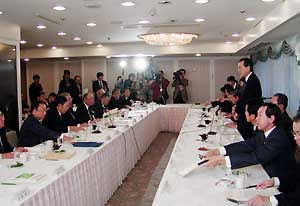|
|
| Photo:
Opinions exchanged on the Spring Struggle, etc. |
On January 17th, RENGO and NIKKEIREN
(Japan Federation of Employers’ Associations) jointly held their RENGO/NIKKEIREN
Roundtable Conference at a hotel in Tokyo attended by President Sasamori, Deputy
President Sakakibara and others from RENGO as well as Chairman Okuda, Vice Chairman
Yamaji and others from NIKKEIREN. Some of the topics they vigorously exchanged
opinions on included the Spring Struggle 2002, employment measures, work sharing,
and medical care system reform. Both sides agreed to cooperate in those areas
that they share a common recognition of regarding medical care system reform.
Sasamori gave the opening address saying, “NIKKEIREN’s ‘2002
Labor Problem Inquiry Committee Report’ emphasized correcting high-cost constitution/structure,
and that they were all related to the reduction of total personnel costs. But
I do not think that is the case.” Sasamori indicated the danger of the report’s
stance toward “base raises as out of the quest, wage reductions as expected.”
He called for “serious talks to see just how far each side was really prepared
to suffer the pain together.” Further, touching on the inauguration of the
Japan Business Federation in May, Sasamori demanded that “this organization
utilize the things NIKKEIREN has developed until now regarding problems of labor/management
relations.”
Chairman Okuda said, “within these conditions of deflation and falling prices,
wage standards adjustments are inadequate and labor’s relative share has
risen. The burden of total personnel expenses is big and there is a sense of surplus
in employment. With that reality in mind, we want both labor and management to
judge objectively and fairly, and we want a serious and honest exchange of opinions
at this coming Spring Struggle’s negotiations.”
During the exchange, there were various opinions from the NIKKEIREN-side including:
“immediate reform of restrictions on the labor market is needed, a discretionary
work system should be exempted from application of the time restrictions in the
Labor Standard Law.” “Increase productivity on every level. Further,
unlike America, Japanese wages are level regardless of productivity and makes
costs extremely high.”
RENGO heard all of these opinions and responded, “easing restrictions on
labor (NIKKEIREN’s argument) only seeks what is convenient for management
which goes too far.” “Compared to the United States, Japan’s manufacturing
industry has low wages despite its high productivity.”
Both sides have recognized that medical care system reform is “grossly inadequate”
and sought to cooperate together on those areas that they jointly recognize: containing
total medical expenses, disclosing information including IT (information technology),
shifting from a result-payment system to an inclusive flat-payment system, etc.
RENGO submitted plans to hold a four-party symposium that include the Japan Medical
Association and National Federation of Health Insurance Societies.
|
